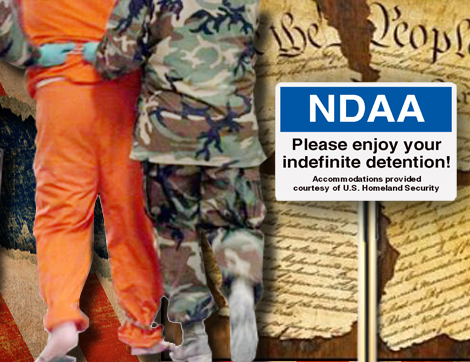
By Pete Papaherakles
On September 12, civil liberties advocates sighed in relief as U.S. Judge Katherine Forrest permanently struck down indefinite detention provisions of the notorious National Defense Authorization Act (NDAA). This blatant violation of Americans’ constitutional liberties is law no more, although an appeal is still possible.
Judge Forrest ruled that the law was unconstitutional. “First Amendment rights are guaranteed by the Constitution and cannot be legislated away,” the judge wrote. “This court rejects the government’s suggestion that American citizens can be placed in military detention indefinitely for acts they could not predict might subject them to detention.”
According to an article in RT, “Only hours after Judge Forrest issued last week’s ruling, the Obama administration threatened to appeal the decision, and on Monday morning they followed through. At around 9 a.m. Monday, September 17, the White House filed an emergency stay in federal appeals court in an effort to have the Second Circuit strip away Judge Forrest’s ruling from the week earlier.”
Section 1021 of the NDAA, which contained the controversial provisions, would have allowed for indefinitely detaining U.S citizens without the right of habeas corpus. This right is so fundamental to the Constitution that it was one of the main causes for the American War of Independence. Habeas corpus, which translates as “you shall have the body,” states that an accused person must be physically brought before a judge with a statement demonstrating sufficient cause for arrest.
The Continental Congress held King George III accountable for his failure to enforce this basic human right. Yet in 2012 our own government saw fit to deprive its own citizens of this same right in the name of fighting terrorism. By redefining what a terrorist is, the Department of Homeland Security would have potentially been able to indefinitely detain any American without formally charging him of a specific crime.
The NDAA had been challenged earlier this year by journalists, scholars and political activists including Chris Hedges, Noam Chomsky, Daniel Ellsberg and Naomi Wolf. A temporary injunction had already been placed on the provision by Judge Forrest in May. Hedges, a Pulitzer prize winner and former New York Times war correspondent, led the challenge with a lawsuit against the bill in January. The plaintiffs testified in court that they had no assurance that their writing and advocacy activities could not be deemed “terrorism.”
The provision subjected to indefinite detention anyone who “substantially” or “directly” provided “support” to terrorists. Judge Forrest questioned how “substantial support” can be determined. “That’s no small question” she said. “It’s a question about defining an individual’s core liberties.”
She questioned the criteria and the methods the government would use to determine if an article or video posted to the Internet “substantially supported” the terrorists or even how to distinguish between “modest” and “substantial” support.
“In short, the court can find no authority in domestic law or the law of war, nor can the government point to any, to justify the concept of ‘support’ as a valid ground for detention” she said.
Plaintiffs’ lawyer Bruce Afran called the ruling “historic” and said it was rare in the last half century that a judge would declare a federal statute unconstitutional for directly intruding on speech.
——
Peter Papaherakles, a U.S. citizen since 1986, was born in Greece. He is AFP’s outreach director. If you would like to see AFP speakers at your rally, contact Pete at 202-544-5977.



